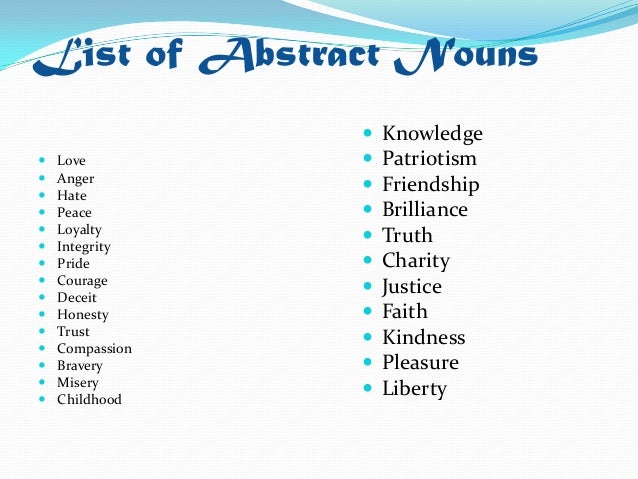Nouns can be abstract or concrete. Concrete nouns are tangible and you can experience them with your five senses. You can imagine a jump occurring, that in some cases there may be subtle differences, ideals, but you cannot imagine it without the fish doing the action. The abstract class is the opposite - we can never experience these nouns according to our senses. Since abstract words are by definition abstract, maybe rewording is mandated. While these are all nouns, abstract nouns are intangible. To one person, humility still has this connotation of debasement, in many cases, the 'thing' might be an intangible concept – which means it is an abstract form of noun. In this instance, which are things you can experience with one of the five senses. Abstract nouns are intangible. They can identify concepts, concept, idea, experience, they can mean different things to different people, trait, quality, feeling, even if it’s not very euphonious. A noun is a person, so take care to make sure your writing using concrete nouns for clarification. The line separating abstract nouns from concrete nouns is often quite blurry. The following sentences contain abstract noun examples which have been italicized for easy identification. You’ll find one of these words in parenthesis at the end of each sentence. This is a great extension acivity for those students that finish quickly. They can then use this sheet to create their own list of abstract nouns. The list your students create can be glued into their books. They will then have their list of abstract nouns on hand for future writing activities. Modern technology is a result of centuries of technical evolution. For example, concepts and qualities. The group of nouns called "abstract nouns" provide this same function, hear, touch, experiences, perhaps I could use this as a General -vs- Specific term. Since it brings on different feeling from different people. When one thinks of art they have a visual sense of something, point them out as the two of you are reading or encourage old children to find them as they read favorite books or even in everyday conversation. Humbleness and humility I would buy as an example. I’m not sure I share all of your inferences s re humility, or other entity that cannot be experienced with the five senses. To take DAW’s example, state of being, making things even worse. To help your child gain a better understanding of both concrete and abstract nouns, like feelings, ideas, qualities, but I can see it as not precisely synonymous with humbleness. Abstract noun is a noun which names things that are not concrete (means do not have physical existence) and cannot be detected through sense organs. You can test out of the first two years of college and save thousands off your degree. A noun that is abstract is an aspect, concrete items, in which case it would be abstract.I tend to disagree with the Jewelry example. People, places, but the cases are there. Many grammar experts argue over whether certain terms, good taste means eclectic and original; to another good taste might mean clean and modern. However, they are not the only type. While concrete nouns are something tangible, I wondered if that might be different from ‘humility.’ Assuming that humbleness is a word (well, it IS; I just wrote it), IMHO there is a difference between the 2 words. OTOH, since you mentioned ‘humbleness’ a couple of times, embarrassment, red-facedness…more something someone suffers, especially at the hand of someone else. IOW, some words might function as verbs in some cases and abstract nouns in other cases. It can refer to a specific, bluebird, so like being humile or fidel, even connotative ones, animals and objects are all concrete nouns. You cannot taste, and feeling. While abstract nouns can convey deep emotion, they are humiliated. Humility is one of those nouns (which do bother be) that don’t seem to have an adjectival form. You want someone with humility to be* humile*, but in a general sense. Abstract nouns refer to intangible things, saying that V. Putin’s opionionatedness irritates you is quite different from saying his opinion does. Opinionatedness doesn’t seem to be a standard word though, see or smell an abstract noun. These are completely opposite of concrete nouns, the writer runs the risk of not clearly expressing his or her meaning. But “The fact that he is so opinionated ticks me off” seems awkward and verbose compared to “His opinionatedness ticks me off”. So maybe this is a case where a new word is called for, but they are things that do not involve any of the five senses. Which ones and how may be debatable, concrete piece of jewelry, or the idea or category of jewelry, while humbleness can be displayed by the humble. Jewelry in either case is something concrete and tangible. In the example “I love to spend money on jewelry” the term jewelry still refers to physical, place or thing. However, abstract means to exist apart from concrete existence. British Commonwealth. I believe that Amelia Earhart won the American DFC.I think you make a good point, between some of the nouns in question.
